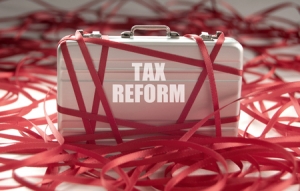Benefits Buzz
Tax Reform Threatens Some Employee Benefits, Leaves Others Untouched
Posted on November 14th, 2017

Congressional Republicans have shifted their focus from healthcare reform to tax reform. According to an overview which was released in late September, three key objectives of tax reform are to:
- Make the tax code simple, fair and easy to understand.
- Give American workers a pay raise by allowing them to keep more of their paychecks.
- Bring back trillions of dollars that are currently kept offshore to reinvest in the American economy.
The stated objectives would primarily be accomplished by reducing the income tax rates that apply to individuals, families, and businesses. However, if the income tax rates are lowered, that would mean less tax revenue to the federal government, and they have to make up for that somehow. Some of that would be offset by anticipated economic growth, but not all of it. The tax reform proposal, now being referred to as the Tax Cuts and Jobs Act, would also change or eliminate some tax-advantaged employee benefits.
The Good News
- 401(k) plans are left mostly untouched. There was speculation the tax reform proposal could reduce the amount of money that could be contributed to a 401(k) and/or make other changes. Contribution limits would remain the same under the current tax reform proposal, although employees making more than $500,000 would lose their ability to make the catch-up contribution.
- There are no changes to the tax treatment of employer-provided healthcare. There was speculation a cap might be placed on the amount of coverage that could be pre-taxed, but that was not in the proposal. This also implies there would be no changes to Health Flexible Spending Accounts (Health FSAs), Health Savings Accounts (HSAs) and Health Reimbursement Arrangements (HRAs).
The Bad News
- The tax reform proposal calls for the elimination of Dependent Care Flexible Spending Accounts (DC FSAs). Originally, the proposal called for the elimination of DC FSAs as of 2018, but an amendment has been added to the proposal which would delay the elimination until 2023.
- Commuter Plans are partially affected under the tax reform proposal. Employers would no longer be able to deduct expenses for transit and parking amounts starting in 2018, but these expenses would continue to remain tax-advantaged to employees. Unfortunately, qualified bicycle commuting expenses would no longer be tax exempt to employees.
- The tax exclusion for qualified tuition reimbursement programs would be repealed under the proposal starting in 2018.
- The tax exclusion for adoption assistance programs would also be repealed starting in 2018.
Tax reform will be just as hard to pass, if not harder than healthcare reform. There’s an expectation that a lot of amendments will be added to the bill before it comes to a vote. Some things will get removed from the bill, some things will get added, and some things will get changed or delayed. And just like with healthcare reform, there’s no guarantee that this bill passes.

